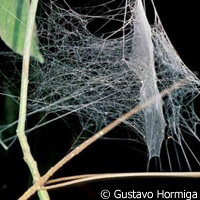Orb webs and the mighty spider
An international team of researchers has discovered that the spiders responsible for producing magnificent webs, what are known as 'orb webs', probably originated from a single spider. The findings of the study, presented in the journal Proceedings of the Royal Society, suggest that the diversification of spider webs was triggered by the need to find a new habitat in the natural world, such as stems and trunks, and to use natural resources more efficiently. Spiders are considered to be one of the world's oldest and most diverse creatures on the planet; scientists have access to a fossil register dating back to the Devonian Period, which was 380 million years ago. Researchers have identified nearly 40 000 species of spiders, which are the world's leading arthropod predators of microfauna in the natural world. In this latest study, researchers from Denmark, Germany, Mexico, Spain and the United States used molecular biology and bioinformatic tools able to assess evolutionary patterns in order to tackle the phylogenetic analysis of deoxyribonucleic acid (DNA) sequences. The researchers probed the molecular differences in 6 genetic markers derived from a sample of 291 spider species. Of the 22 families of Orbiculariae, 21 were represented in the study. 'This scientific study looks at the most complete taxonomic sample examined to date, in terms of the number of species and families represented, to understand the phylogeny of spiders that weave orb webs, analysing the DNA sequences of all available genetic markers,' says Professor Miquel A. Arnedo from the Biodiversity Research Institute at the University of Barcelona in Spain, one of the authors of the study. The experts say orb weavers emerged around 200 million years ago, during the Middle Triassic epoch. They rapidly diversified in the latter stages of the Triassic and the Early Jurassic. 'In the article, we suggest that the changes in spider webs are intended to facilitate the move to new habitats and to make better use of the trophic resources in different ecosystems,' Professor Arnedo says. 'In other words, the abundance of prey and the structural complexity of the habitat are more influential factors than the actual diversification of the prey. Moreover, according to our study, the biological explosion of orb webs would not have coincided with the rapid diversification of insects,' he adds. 'Spiders are generalist predators, and few cases have been found in which they specialise in a particular type of prey. In addition, most spiders do not weave orb webs or produce more irregular forms. It is not the capacity to weave webs that has enabled spiders to diversify but rather their ability to produce silk, and this is not the same thing. Silk threads, which are produced by many arachnid species, can be used for anchorage, movement, nest-building, protecting eggs, and so on.' The researchers also discovered that spiders developed various strategies to catch prey. Orb webs are complex to make, but are very strong and also very flexible. Their special features are due to the complex stereotyped pattern of behaviour in spiders. Says Professor Arnedo: 'The great diversification began with sticky silk, which is a more efficient material and easier for spiders to produce. In our study, we found that all of the evolutionary innovations that have occurred since the first orb webs emerge independently, require less energy to be expended by the spider, and demand fewer behavioural patterns.'For more information, please visit: University of Barcelona:http://www.ub.edu/web/ub/en/Proceedings of the Royal Society B: Biological Sciences:http://rspb.royalsocietypublishing.org/
Countries
Spain



